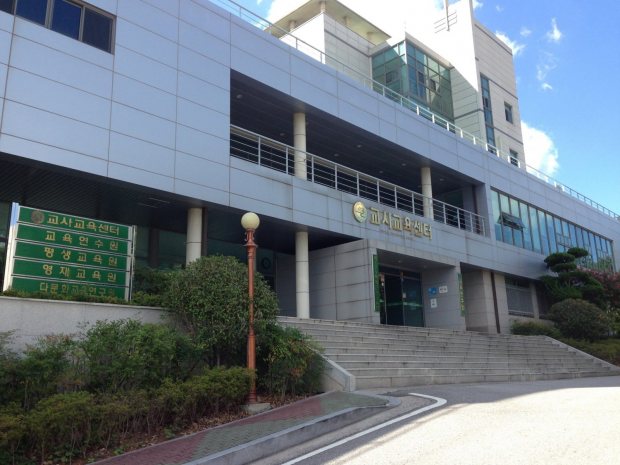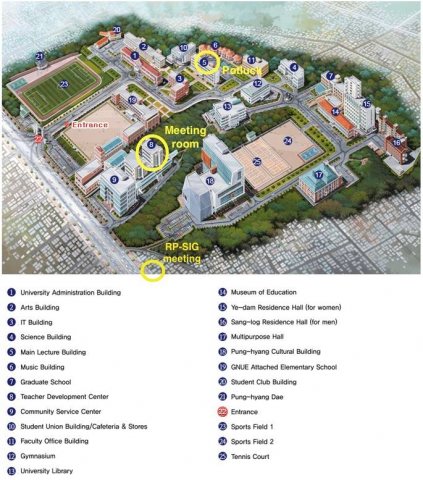
Gwangju-Jeonnam Chapter November Meeting
.
––– Morning Reflective Practice Session –––
Topic: Mise-en-scène - Revisiting Classroom Setup
Time: Nov. 17, 11:00 - 12:30 (3rd Saturday)
Location: Coffee Lab Mujii, near GNUE. (Ground floor of 광주우리교회 Building. Map at bottom, and another HERE.)
Facilitator: Bryan Hale
––– MAIN MEETING SCHEDULE –––
Time: 3rd Saturday, November 17, 2018, 1:45ㅡ5:00 pm
Location: Gwangju National University of Education (GNUE), Teacher Training Center (교사교육센터) 1st Floor; Room 811. Detailed directions HERE.
1:45 pm: Sign-in and Meet-and-Greet (Admission: Free for newcomers. Membership welcomed.)
2:00ㅡ2:50 pm: Presentation 1:
ㅡ Creativity in Five Acts
ㅡ Roger Fusselman (Joongbu University, Seoul)
2:50ㅡ3:10 pm: Refreshment Break
3:10ㅡ4:00 pm: Presentation 2
ㅡ Seeing Through Your Students’ Eyes: Detecting Visual Problems
ㅡ Becca Haydon (Dongshin University, Naju)
4:05ㅡ4:25 Annual Chapter Elections
4:25ㅡ4:45 pm: Swap-Shop Presentations
Share your Teaching Ideas, Classroom Activities, and Teaching Wisdom with the group.
(Everyone is encouraged to share [up to 5-6 min. each]. Short tidbits are welcomed. Handouts also welcomed.)
4:45 - 5:00 pm: Announcements / Drawing for Door Prizes / Closing
(After-Meeting Dinner for those who wish to participate. Venue: The First Alleyway)
Session Summaries
Creativity in Five Acts
Roger Fusselman
This presentation breaks down five angles by which creativity can be categorized. These categories—or acts, as we can call them—answer various questions. What is the engine of creativity? What conditions people to focus and achieve creative work? How can we maximize creativity in the moment of creation? What benchmarks are there in pushing us to create at our best? How can we be persistent in the act of creativity when fatigue, distraction, and dismay affect us? This presentation briefly indicates possible answers to these questions. Application to teaching, from the teacher making choices to the student creating independently, will be indicated. This presentation mixes presentation, guessing, and interactive activities to both explain and demonstrate these principles and how they may influence our work as teachers.
The Presenter

A long-time member of KOTESOL and a popular presenter, Roger Fusselman has been a teacher, teacher trainer, and presenter. He has taught at Seoul National University of Education and Sookmyung Women’s University, a number of language institutes, and other environments. He currently teaches at Joongbu University in scenic Goyang. He is also accomplished as a member of Toastmasters and Seoul City Improv, both areas in which he has developed his skills in creativity and broadened his understanding. Roger’s current interests include learner autonomy, creativity in teaching, materials design, vocabulary, and the application of philosophy to TESOL. He can be reached at mrfusselman@gmail.com.
Seeing Through Your Students’ Eyes: Detecting Visual Problems
Becca Haydon
It is estimated that over 25 percent of school-aged children have a visual problem that impedes their progress in the classroom. Most school vision screenings are not extensive enough to catch these visual issues, thus leaving teachers and parents to believe the students are adequately prepared for the visual tasks required of them at school. Unfortunately, all too often, cognitive or behavioral issues are, in fact, visual problems.
Because we as teachers cannot see through our students’ eyes, we can’t know what and how they see. Are the words dancing on the page? Is it too difficult to quickly look back and forth from their book to the board? Are they constantly tired because they have to strain to focus on anything they look at? When these are primary issues, classroom content becomes secondary for the student.
During this presentation, you’ll learn the various reasons that students’ vision could be affecting their performance and behavior in the classroom. You will learn to be aware of and to detect the observable cues and symptoms of a visual problem. In addition to professional resources for referral, you’ll also be given modifications and accommodations that can help these students succeed in the classroom.
The Presenter

Becca Haydon is a wellness coach and educator who has lived, worked, and taught in various places throughout the world. Her experiences in classroom education, kinesiology, numerology, yoga, and vision therapy weave their way into all she does. She earned her master’s degree in TESOL from the University of San Francisco in 1997. In addition to classroom teaching, she has spent the past few decades training in a handful of modalities and spent several years working at Boulder Valley Vision Therapy in Colorado, USA. As a vision therapist, she worked with school-aged children to train their visual system in order to achieve academic and athletic success.
___________________________
Reflective Practice Session
Mise-en-scène: Revisiting Classroom Setup
.
In this session we'll look at our classroom setups through the lens of mise-en-scène, and describe our classrooms with language that might be used in the worlds of theater of film. Hopefully, we'll get some fresh insights into how our students experience our classrooms and what our classrooms mean to them.
Facilitator & Set Director: Bryan Hale
___________________________
Photo: The Gwangju National University of Education (GNUE / 광주교육대학교), Teacher Training Center (교사교육센터), venue for our main meeting ㅡ 1st floor, Room 811.




